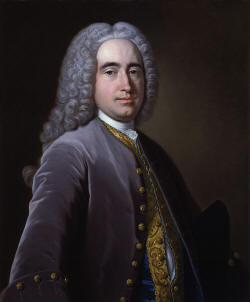

Queer Places:
Holland House, Ilchester Pl, Kensington, London W8 6LU, UK
Kingsgate Castle, Broadstairs CT10 3PH, UK
All Saints Churchyard
Farley, Wiltshire Unitary Authority, Wiltshire, England
 Henry Fox, 1st Baron Holland, PC (28 September 1705 – 1 July 1774), of Holland House in Kensington and of Holland House in Kingsgate, Kent, was a leading British politician. He identified primarily with the Whig faction. He held the posts of Secretary at War, Southern Secretary and Paymaster of the Forces, from which latter post he enriched himself. Whilst widely tipped as a future Prime Minister, he never held that office. His third son was the Whig statesman Charles James Fox.
John Hervey, 2nd Baron
Hervey was attracted to Henry Fox before his affair with Henry's older
brother,
Stephen Fox.
Henry Fox, 1st Baron Holland, PC (28 September 1705 – 1 July 1774), of Holland House in Kensington and of Holland House in Kingsgate, Kent, was a leading British politician. He identified primarily with the Whig faction. He held the posts of Secretary at War, Southern Secretary and Paymaster of the Forces, from which latter post he enriched himself. Whilst widely tipped as a future Prime Minister, he never held that office. His third son was the Whig statesman Charles James Fox.
John Hervey, 2nd Baron
Hervey was attracted to Henry Fox before his affair with Henry's older
brother,
Stephen Fox.
He was the second son of Sir Stephen Fox and his second wife the former Christiana Hope, and inherited a large share of his father's wealth. He squandered most of it soon after attaining his majority, and went to Continental Europe to escape from his creditors. There he made the acquaintance of a woman of fortune, who became his patroness and was so generous to him that, after several years’ absence, he was in a position to return home.
In 1744 he eloped with and married the much younger Lady Caroline Lennox (1723–1774), the eldest daughter of Charles Lennox, 2nd Duke of Richmond (1701–1750). The Duke of Richmond was the grandson of Charles II, the duke's father having been the child of Charles and his mistress, Louise de Kérouaille, Duchess of Portsmouth. Lady Caroline's marriage caused a great scandal in high society.[1] She was later created Baroness Holland, "of Holland in the County of Lincoln". To his wife, Lord Holland bequeathed £2,000 per annum, with Holland House, Kensington, his plate, etc., but charged with various other legacies. As his residuary legatee it was estimated that she would be worth £120,000 in government securities, besides her jointure.[2] However, she did not long survive him. By his wife he had children including: Stephen Fox, 2nd Baron Holland (1745–1774), eldest son and heir, of delicate health in his early childhood.[1] Like his younger brother he was a notorious gambler. His father bequeathed him his Wiltshire estate, £5,000 per annum and £20,000 cash.[3] Henry Charles Fox (1746–1746), second son, died in infancy.[1] Charles James Fox (1749–1806), third but second surviving son, the noted Whig statesman and notorious gambler. He was born in Conduit Street, Mayfair, as his father's new home of Holland House in Kensington, leased in 1746, was being redecorated.[1] His father bequeathed him his Sheppy and Thanet estates in Kent, including Kingsgate, £900 per annum, and £20,000 cash.[3] General Henry Edward Fox (1755–1811), youngest son, to whom his father bequeathed an estate in the North, £500 per annum, and £10,000 cash.[3]
In 1762, Henry Fox again accepted the leadership of the House, with a seat in the Cabinet, under Lord Bute and managed to induce the House of Commons to approve of the Treaty of Paris; as a reward, he was raised to the House of Lords as Baron Holland of Foxley in the County of Wilts, on 16 April 1763.
He tried in vain to obtain promotion to an earldom, a title on which he had set his heart, and he died at Holland House, Kensington, a sorely disappointed man, with a reputation for cunning and unscrupulousness, the most unpopular politician of his day.
My published books: